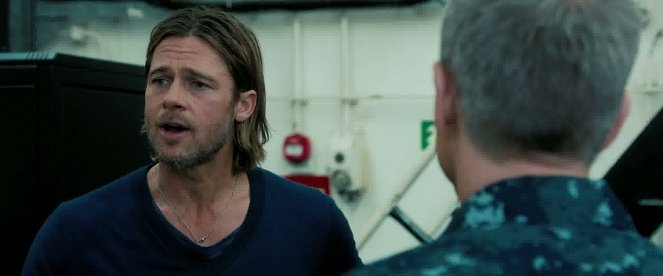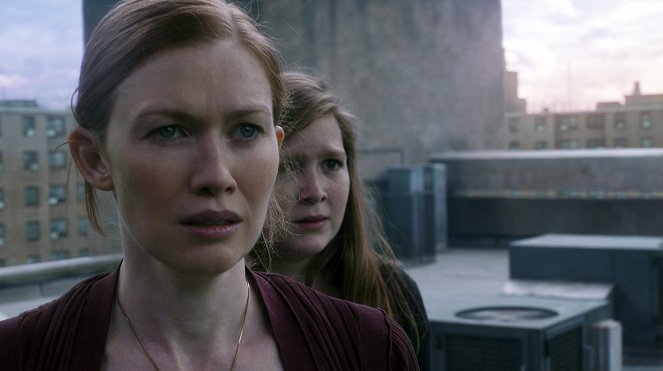Réalisation:
Marc ForsterMusique:
Marco BeltramiActeurs·trices:
Brad Pitt, Mireille Enos, David Morse, דניאלה קרטס, James Badge Dale, David Andrews, Ludi Boeken, Matthew Fox, Moritz Bleibtreu (plus)VOD (3)
Résumés(1)
Un jour comme les autres, Gerry Lane et sa famille se retrouvent coincés dans un embouteillage monstre sur leur trajet quotidien. Ancien enquêteur des Nations Unies, Lane comprend immédiatement que la situation est inhabituelle. Tandis que les hélicoptères de la police sillonnent le ciel et que les motards quadrillent les rues, la ville bascule dans le chaos.. (Paramount Pictures FR)
(plus)Vidéo (33)
Critiques (12)
In spite of all the media failures (being over-budget, reshoots), Forster presents a rather unconventional zombie spectacle that works more along the lines of a flamboyant action movie in which a middle-class family and the world around them are drowning. The brilliantly paced direction (supported by good editing) pushes forward a plot vacuum that boils down to the fact that it takes the title and two or three prominent geopolitical allusions from a brilliant book, whilst then treading its own path to get to its roots, i.e., the horror in the lab. However, having a tighter dramatic arc, not limited to alternating the three locations where the protagonist arrives and the undead horde a minute after him, would not have hurt the film. [I want the Battle of Moscow, at least as a bonus on Blu-ray] 3 ½.
()
"Shit happens." Forster previously demonstrated his inability to direct clearly arranged action scenes in Quantum of Solace. Despite its misleading marketing, however, World War Z fortunately is not built on a foundation of action attractions. The most powerful weapon in its arsenal is its consistent use of the zombie genre’s social dimension in the manner of Romero. The constant switching between micro and macro perspectives shows that, when chaos breaks out, the individual knows just as little as the institutions, which realistically do not subordinate their interests to the individual’s personal safety (you are either with us or you’re on your own). The fact that the narrative is not limited to what one person or group of people knows makes it impossible to describe World War Z as a film that uses a video-game narrative structure in a well-thought-out way. Despite that, Gerry’s approach corresponds to the narrative model that game studios call “string of pearls”. Only after the storytelling potential of one setting has been fully exhausted (and the notional end of the level has been reached) is it possible to move on to a different setting. But this isn’t merely a matter of monotonously collecting information that leads to more information. On the one hand, the film defies expectations in how it humorously handles the element of (blind) chance and, on the other hand, it continuously changes the context in which it addresses the zombie contagion. It works its way from the dominant family context through the military, political and medical contexts back to the family context (whose supremacy is pointed out to us with varying degrees of emotional aggressiveness throughout the film). Not only does this confirm the use of the melodramatic formula that forms the basis of most Hollywood blockbusters (really, seeking out melodrama in everything is just one of my quirks), but the chosen narrative arc also nicely serves the film’s humanistic message encouraging us to not be ashamed of our weaknesses (our humanity, which makes us vulnerable, but which is also our most powerful weapon). Thanks to Brad Pitt’s solid performance, the film’s emotional level is not completely superfluous and I unabashedly admit that I was touched by Gerry’s written plea shortly before the end. In terms of distributing information and drawing parallels between the current political situation and the fictional zombie contagion, the clever entertainment ultimately pays a price for the film’s attempt to please too many different groups of viewers. As I have already mentioned, the action scenes are chaotic, the scenes resembling survival-horror games lack original ideas and atmosphere (because we know that there will be running and biting in a few moments anyway), some scenes lack logic (the rusty bicycles were supposed to be quieter than walking?) while forced product placement is prevalent in others (unless you want to see the vending-machine scene as a caustic commentary on consumerism). At any rate, World War Z hums along nicely, has the potential for an even better sequel and, among other films in today’s zombie genre, it is also exceptionally likable due to its tastefulness (which may be a contradiction in terms, but I personally didn’t mind that the crisis also impacted artificial brains, intestines and other delicacies). 75%
()
(moins)
(plus)
World War Z should have been very incoherent, it mixes very different approaches to the zombie sub-genre, but in the end it’s a surprisingly good an interesting film. The creative disagreements can be clearly seen (if there is something the film lacks it’s a solid vision), but paradoxically, that may have contributed to an untraditional narrative outcome. World War Z is basically three stories in one linked by the protagonist, and though they are connected, they are also very different in many aspects. The beginning is similar to Snyder’s Dawn of the Dead (the zombie apocalypse begins, the protagonists try get to safety), the middle part is an action-packed search for the origin of the virus, and the last part is a more intimate laboratory horror story. I had some problems with the middle part, though it does have several excellent set pieces, the search for clues as a whole felt very random and haphazard. By the way, the editor must have gone totally bonkers, in some of the action scenes you can’t see anything, and every shot that was at least a little longer was a joy. Thanks God for that quiet, intimate ending. 75 %. PS: If you want to know what the original ending of the film was like, read this article. I think that in this case it’s pointless to blast Lindelof’s rewrite. The version we saw in cinemas is a lot happier than the dark original ending, but even as a horror fan I don’t think that “dark” always equals “better”. That said, I’d love to watch the battle of Moscow, hopefully the studio will release it, at least in BluRay, they filmed it already.
()
I will admit that all I knew about this movie was that Brad Pitt put a lot of time and money in it. So I thought it might be a decent Hollywood movie. And it was. The creators somehow combined a lot of well-filmed action and added a few philosophical questions on life and family. The finale was a nice surprise. It almost seems like the screenwriter was pondering how to end this movie and wanted to have a different take at it. Why wouldn’t he, when the movie’s biggest issue is that everything is again about zombies? There is an infection spreading, so why complicate things, let’s turn people into zombies again. Why not, when it is so fashionable nowadays, even more when they run around like Usain Bolt? That’s what they’re best at, except for eating people. Well, what can I say? That’s the way it is today.
()
Brrrr... in this film, the ghosts of dead ambitions are haunting. The script (re-written three times) bears witness to a shift from a not entirely perceived personnel perspective (a whiff of institutional crisis and slight hints of the sociology of disaster brought to a solid level by Forster's more civilian direction), to a bombastic spectacle (action adventure structure including some sequences that are obviously "scripted" - Jerusalem), and then back to the intimate plane (a completely redesigned ending that left behind the monstrous action storyline in Russia and edited in a bit of intimate Resident Evil in a lab). In addition to the surprisingly certain directing and atmosphere, the whole thing is saved by Pitt, who, even when infected with a can in his hand, looks as if he really cares a lot about the film (perhaps it’s the x million invested in it?). At its core, I like this indecisive wash between Contagion, The Walking Dead and a forgettable "disaster" film. If only because some people had foretold that it would have the fate of the disintegrated catastrophe a la The Invasion, but the film is more like Rise of the Planet of the Apes. The individual levels are actually quite entertaining, and when one abstracts from awkward transitions, the screenwriting issues and the fact that the only thing in common with the original are the undead, it was solid fun overall. [70%] P.S. I would love to bite the idiot who came up with a film with a frenetic cadence of alternating wholes, second-long details and out of focus shots converted into 3D. If you can, just avoid this desperate attempt to save an overburdened budget.
()


